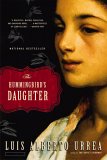Summary | Excerpt | Reading Guide | Reviews | Beyond the Book | Readalikes | Genres & Themes | Author Bio

Critics' Opinion:
Readers' Opinion:
First Published:
May 2005, 512 pages
Paperback:
Apr 2006, 528 pages
Only rich men, soldiers, and a few Indians had wandered far
enough from home to learn the terrible truth: Mexico was too
big. It had too many colors. It was noisier than anyone could
have imagined, and the voice of the Atlantic was different from
the voice of the Pacific. One was shrill, worried, and
demanding. The other was boisterous, easy to rile into a
frenzy. The rich men, soldiers, and Indians were the few who
knew that the east was a swoon of green, a thick-aired smell of
ripe fruit and flowers and dead pigs and salt and sweat and
mud, while the west was a riot of purple. Pyramids rose between
llanos of dust and among turgid jungles. Snakes as long as
country roads swam tame beside canoes. Volcanoes wore hats of
snow. Cactus forests grew taller than trees. Shamans ate
mushrooms and flew. In the south, some tribes still went nearly
naked, their women wearing red flowers in their hair and blue
skirts, and their breasts hanging free. Men outside the great
Mexico City ate tacos made of live winged ants that flew away
if the men did not chew quickly enough.
So what were they? Every Mexican was a diluted Indian,
invaded by milk like the coffee in Cayetana's cup. Afraid,
after the Conquest and the Inquisition, of their own brown
wrappers, they colored their faces with powder, covered their
skins in perfumes and European silks and American habits. Yet
for all their beaver hats and their lace veils, the fine
citizens of the great cities knew they had nothing that would
ever match the ancient feathers of the quetzal. No cacique
stood atop any temple clad in jaguar skins. Crinolines,
waistcoats. Operas, High Mass, café au lait in demitasse cups
in sidewalk patisseries. They attempted to choke the gods with
New York pantaloons, Parisian petticoats. But still the
banished spirits whispered from corners and basements. In
Mexico City, the great and fallen Tenochtitlán, among streets
and buildings constructed with the stones of the Pyramid of the
Sun, gentlemen walked with their heads slightly tilted, cocked
as if listening to this puzzling murmur of wraiths.
They still spoke a thousand languages—Spanish, too, to be
sure, but also a thicket of songs and grammars. Mexico—the
sound of wind in the ruins. Mexico—the waves rushing the shore.
Mexico—the sand dunes, the snowfields, the steam of sleeping
Popocatépetl. Mexico—across marijuana fields, tomato plants,
avocado trees, the agave in the village of Tequila.
Mexico. . . .
All around them, in the small woods, in the caves, in the
precipitous canyons of copper country, in the swamps and at the
crossroads, the harsh Old Ones gathered. Tlaloc, the rain god,
lips parched because the Mexicans no longer tortured children
to feed him sweet drafts of their tears. The Flayed One, Xipe
Totec, shivering cold because priests no longer skinned
sacrifices alive and danced in their flesh to bring forth the
harvest. Tonántzin, goddess of Tepeyac, chased from her summit
by the very Mother of God, the Virgen de Guadalupe. The awesome
and ferocious warrior god, Hummingbird on the Left,
Huitzilopochtli. Even the Mexicans' friend, Chac Mool, was
lonely. Big eared and waiting to carry their hopes and dreams
in his bowl as he transited to the land of the gods from the
earth, he lay on his back watching forever in vain for the
feathered priests to return. Other Old Ones hid behind statues
in the cathedrals that the Spaniards had built with the stones
of their shattered temples. The smell of sacrificial blood and
copal seeped out from between the stones to mix with incense
and candles. Death is alive, they whispered. Death lives inside
life, as bones dance within the body. Yesterday is within
today. Yesterday never dies.
Copyright © 2005 by Luis Alberto Urrea





The Flower Sisters
by Michelle Collins Anderson
From the new Fannie Flagg of the Ozarks, a richly-woven story of family, forgiveness, and reinvention.

The House on Biscayne Bay
by Chanel Cleeton
As death stalks a gothic mansion in Miami, the lives of two women intertwine as the past and present collide.

The Funeral Cryer by Wenyan Lu
Debut novelist Wenyan Lu brings us this witty yet profound story about one woman's midlife reawakening in contemporary rural China.
Your guide toexceptional books
BookBrowse seeks out and recommends the best in contemporary fiction and nonfiction—books that not only engage and entertain but also deepen our understanding of ourselves and the world around us.